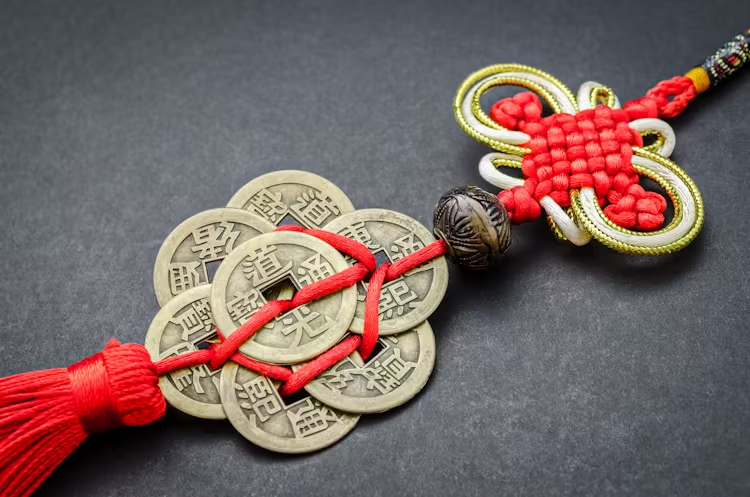Imani Tailly
News Writer

A traditional Chinese New Year gift of coins wrapped with red string. Photo credit: ChineseNewYear.net
Chinese New Year is a memorable holiday that people celebrate in China and many other places worldwide. The 2024 holiday took place from Feb. 10 to 17. Many Chinese-Americans celebrate the holiday here in the U.S. Dr. Meiqing Sun, the head of the Chinese department at UNC Greensboro, described the holiday as “a year’s expectations.” She recalled the gifts she expected as a child, including clothes and snacks, playing with other kids, and seeing family and friends. As an adult, she’s taken on different responsibilities related to the holiday. The celebration differs in the states, but she remarked, “The Spring Festival is still a festival that every Chinese heart cannot miss.” The holiday has expanded; people without a Chinese background have started participating, and many local places hold events.
Xiao Rao, a Chinese teacher at UNCG, also shared his experience with the holiday. As a kid, he waited for red envelopes and visited his family in his hometown. He celebrates the holiday here in America by video calling his family and preparing a special dinner the night before the New Year (the night called 除夕). He also discussed helping with and attending Spring Festival events on UNCG’s campus, sharing that the holiday is “a time for family reunion, reflection, and praying for good luck and prosperity for the new year.”
Though it has recently become more well-known among people who are not of Chinese descent, Chinese New Year (新年), also called the Spring Festival (春节), is a national holiday that people have celebrated in some form for millennia. Its traditions involve removing bad luck and bad spirits, letting in good luck, and bringing a good harvest. The holiday is based on the story of an evil creature and a brave old man who stood up to it.
The Nian (年) was a water creature who would wreak havoc on villages. It ate crops, livestock, and occasionally the villagers. It appeared once a year, and the people of the villages would hide and seek shelter from it. A strange man appeared one year, and despite the villagers telling him to hide, he refused to seek refuge with them. When the villagers emerged from hiding, they discovered the man was unharmed. They were in disbelief and asked how the man survived. He explained that he figured out that the Nian was afraid of loud noises and the color red. To prevent its attack, he displayed red banners, dressed in all red, and cracked bamboo to make a loud popping sound. The combination was successful in scaring off the beast.
Several Chinese New Year traditions are based on the tale of this man, though the traditions have changed and modernized over the centuries. According to a Timothy S. Y. Lam Museum of Anthropology summary of the holiday, Chinese New Year is believed to be around 3,500 years old. Its origin likely dates to the Shang Dynasty, but it began to take a more formal shape during the Zhou and Han Dynasties.
It became a national holiday in China in 1949 and was named the Spring Festival. Popular foods like rice cakes (年糕), a representation of success, and longevity noodles (长寿面), a symbol of long life, have become staples of the celebration. The tradition of giving red envelopes (红包) to young family members is a common practice. People often wear red clothes and follow specific rules, such as not cleaning for a certain period after the New Year’s start, to avoid wiping away any good luck.
The Chinese Lunar New Year Calendar has 12 animals. This year’s animal is the dragon (龙). According to an article in The Daily, the dragon symbolizes “power, good fortune, and strength.” People born in this year are said to be smart, ambitious, and charismatic. Historically, Chinese emperors claimed to be descendants of dragons, possessing their authority and regal nature.
Chinese New Year is a unique holiday filled with cultural meaning and history. From its beginnings as a tale of a brave, wise old man to its modern adaptations and celebration, it’s a long-standing holiday with great importance to all who celebrate it. Although the official Chinese New Year has passed, its values remain significant throughout the year. 新年快乐 (xīn nián kuài lè, or Happy Chinese New Year)!

